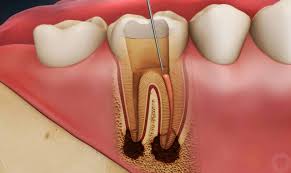When your dentist says the words “root canal,” what’s your first reaction? If you're like most people, you might instantly think of pain, discomfort, and a procedure you'd rather avoid. Root canals have a long-standing (and largely undeserved) reputation for being one of the most painful dental treatments. But how accurate is that perception in today's world of advanced dentistry?
In this blog, we’ll explore the truth behind root canal procedures—what they are, why they're needed, and most importantly, whether or not they’re actually painful.
What Is a Root Canal?
A root canal is a dental procedure designed to treat infection or damage within the pulp of a tooth—the soft tissue at the center that contains nerves, blood vessels, and connective tissue. This area can become inflamed or infected due to deep decay, repeated dental procedures, cracks, or trauma.
During a root canal, your dentist or endodontist removes the damaged or infected pulp, cleans and disinfects the inside of the tooth, and then fills and seals it to prevent future infection. Finally, a crown is usually placed over the tooth to restore its strength and function.
Why Are Root Canals Necessary?
Root canals are often necessary to:
- Save a tooth that would otherwise need to be extracted
- Eliminate pain from an infected or abscessed tooth
- Prevent the spread of infection to other parts of the mouth or body
Contrary to common belief, the purpose of a root canal is not to cause pain—it’s actually to relieve it.
The Pain Myth: Where Did It Come From?
The myth that root canals are extremely painful likely comes from decades past, when anesthesia and dental techniques were not as advanced as they are today. In those days, dental procedures could be uncomfortable, especially if the tooth was severely infected.
Today, with modern tools, anesthesia, and sedation options, root canals are no more uncomfortable than getting a standard filling.
So, Is a Root Canal Painful?
Let’s break it down into before, during, and after the procedure.
1. Before the Procedure
If you're experiencing symptoms like severe toothache, sensitivity to hot or cold, swelling, or a bump on your gum, it's likely that the pulp inside your tooth is infected or inflamed. This pain is caused by the infection—not the root canal itself.
In fact, the reason you’re getting a root canal is to stop that pain.
2. During the Procedure
Here’s the good news: a root canal is performed under local anesthesia, which completely numbs the affected area. You shouldn’t feel any pain during the procedure itself—just some pressure or mild sensations, similar to what you might feel during a filling.
For patients with dental anxiety or fear of needles, many dental offices now offer sedation dentistry options like nitrous oxide (laughing gas), oral sedatives, or even IV sedation to help you relax.
Most patients report that the procedure is far less scary than they imagined and that they were comfortable throughout.
3. After the Procedure
It’s normal to feel some mild soreness or sensitivity in the days following a root canal. This is your body’s natural response to inflammation and healing. The discomfort is usually manageable with over-the-counter pain relievers like ibuprofen or acetaminophen and typically subsides within a few days.
If you follow your dentist’s aftercare instructions and avoid chewing on the treated side until your crown is placed, you should heal quickly and with minimal discomfort.
What If You’re Still Nervous?
Dental anxiety is very common, and it's okay to feel nervous before a root canal. If fear of pain or the procedure is keeping you from seeking treatment, talk to your dentist. They can walk you through the process, offer sedation options, and help you feel more in control of your treatment.
Delaying a root canal due to fear can lead to more serious complications, including:
- The spread of infection
- Bone loss around the root of the tooth
- Abscess formation
- Tooth loss
In the long run, getting the procedure done sooner rather than later will save you both pain and money.
How to Know If You Might Need a Root Canal
Some common signs include:
- Severe toothache that doesn’t go away
- Prolonged sensitivity to hot or cold
- Swelling or tenderness in nearby gums
- Discoloration or darkening of the tooth
- A recurring pimple or bump on the gums
Only a dental professional can accurately diagnose whether you need a root canal, often using X-rays to see the extent of the infection.
Conclusion: Root Canals Aren’t What They Used to Be
The idea that root canals are painful is mostly a myth rooted in the past. Thanks to modern dental advancements, the procedure is now routine, relatively quick, and far less uncomfortable than people fear.
If you're experiencing dental pain or have been told you might need a root canal, don’t let fear stop you from seeking help. The truth is: a root canal doesn’t cause pain—it relieves it. If you live in Mysore and looking for safe and reliable root canal treatment in Mysore, schedule a consultation with Murthy Dental Clinic today. Your comfort is our priority.
In the hands of an experienced dentist or endodontist, you’ll likely be surprised at how easy and pain-free the process really is.





Comments